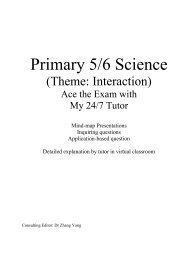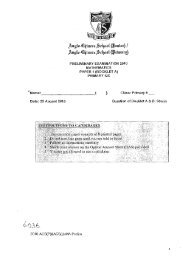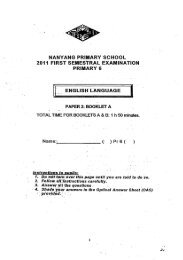Primary 3 English Ace the Exam with My 24/7 ... - Orlesson.com
Primary 3 English Ace the Exam with My 24/7 ... - Orlesson.com
Primary 3 English Ace the Exam with My 24/7 ... - Orlesson.com
You also want an ePaper? Increase the reach of your titles
YUMPU automatically turns print PDFs into web optimized ePapers that Google loves.
so.<br />
Yesterday, Jasmine tidied up her room (27)_________ that <strong>the</strong> baby<br />
cot could be placed in her room. (28)__________ she had to share <strong>the</strong> room<br />
<strong>with</strong> her bro<strong>the</strong>r, she did not mind it at all.<br />
Her baby bro<strong>the</strong>r was named Jimmy after her grandfa<strong>the</strong>r<br />
(29)_________he resembled him a lot.<br />
Section F: Comprehension MCQ (5 marks)<br />
Read <strong>the</strong> following passage and answer <strong>the</strong> questions that follow.<br />
According to Confucian tradition, filial piety is a great virtue to be<br />
extolled and <strong>the</strong> primary duty of all Chinese. The traditional meaning of filial<br />
piety emphasizes love, respect and loyalty towards one’s parents during <strong>the</strong>ir<br />
lifetime and taking good care of <strong>the</strong>m when <strong>the</strong>y grow old. Filial piety,<br />
however, does not mean <strong>com</strong>plete obedience to one’s parents. In fact, some<br />
Confucian scholars believed that <strong>the</strong> adult child should point out <strong>the</strong>ir<br />
parent’s mistakes and advise <strong>the</strong>m accordingly. Filial piety in <strong>the</strong> traditional<br />
sense also emphasises ancestral worship as it was considered important that<br />
<strong>the</strong> love and respect for one’s parents and ancestors continued even after<br />
<strong>the</strong>ir deaths. After his parents’ deaths, <strong>the</strong> eldest son of a family is required<br />
to perform ritual sacrifices at <strong>the</strong> site of his parents’ graves or at <strong>the</strong><br />
temple, for example, by not cutting his hair for three years. Bringing honour<br />
to <strong>the</strong> family by passing <strong>the</strong> Imperial <strong>Exam</strong>inations and producing a male<br />
descendant was also part and parcel of filial conduct in old Chinese culture.<br />
Stories about what constitutes filial piety abound in Chinese history and you<br />
103
















